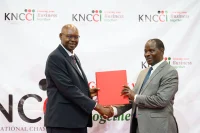Kenya’s commodity trading market has gained steady momentum in recent years, emerging as a key player in Africa’s economic transformation. With its fertile agricultural base, strategic location, and improving regulatory framework, the country is primed for a thriving commodities sector. From farmers and traders to tech innovators and policymakers, stakeholders increasingly see commodity trading as a driver of sustainable growth and financial inclusion.
At the heart of this growth is the Nairobi Securities Exchange (NSE), which has expanded its role beyond equities and bonds to include a fully operational commodities exchange. The Kenya National Multi Commodity Exchange (NMCE) and other emerging platforms have created new opportunities for producers to access better markets for online trading in Kenya while offering investors a more diversified portfolio. These changes have introduced structure and transparency into what was once a fragmented and informal system.
The Rise of Agricultural Commodities and Rural Empowerment
One of the most exciting aspects of Kenya’s commodity trading boom is the increasing participation of smallholder farmers. Traditionally reliant on middlemen and unpredictable market access, these farmers are now gaining more control over the pricing and sale of their products through structured trading platforms. For example, Exness offers a secure and trustworthy commodity trading platform that might just be the key to helping you get started. Maize, tea, coffee, horticultural produce, and livestock are just a few of the commodities now entering more formalized markets.
This trend has far-reaching implications. Not only does it increase income stability for farmers, but it also incentivizes higher production quality, which in turn boosts Kenya’s competitiveness in international markets. As more rural communities become integrated into the trading ecosystem, they benefit from financial literacy programs, improved infrastructure, and greater exposure to global market trends.
Key Drivers Supporting Kenya’s Commodity Trading Expansion:
- Government support and policy alignment: The Kenyan government has prioritized the development of agriculture and market accessibility. Policies aimed at reducing logistical barriers and increasing investment in agricultural processing have fueled growth in commodity trading.
- Technology adoption: Digital platforms, mobile money, and blockchain solutions are being integrated into trading systems. These technologies reduce transaction costs, minimize fraud, and allow for real-time price tracking.
- International collaboration: Kenya’s partnerships with institutions such as the African Union, World Bank, and East African Community have brought funding and expertise to improve market mechanisms and infrastructure.
- Risk mitigation tools: Commodity exchanges now offer risk management options such as futures contracts and price insurance, giving farmers and traders more confidence in their long-term financial planning.
With all these factors in place, Kenya’s agricultural sector is not just producing more—but producing smarter. And as a result, its commodities market is becoming more reliable and attractive to both domestic and foreign investors.
Diversification Beyond Agriculture
While agriculture remains the backbone of Kenya’s commodity sector, interest is growing in areas like energy, minerals, and manufactured goods. With oil discoveries and a push toward green energy sources like geothermal and solar, Kenya is well-positioned to become a regional energy trading hub.
Similarly, Kenya’s mining sector, though still developing, holds significant promise. Minerals such as titanium, gold, and fluorspar are already contributing to export revenues. With better regulatory oversight and sustainable practices, this segment could further boost Kenya’s commodity trading influence.
One notable aspect of Kenya’s commodities future is the role of education and capacity building. Several universities and training institutions now offer programs in commodity trading, agricultural economics, and financial markets. This ensures that local talent can participate in and lead the sector’s transformation.
Technology and Online Platforms: The Future of Trading
Perhaps one of the most transformative trends is the role of digital trading platforms. The shift toward mobile and online trading has made commodities more accessible to a wider audience. For example, mobile apps allow farmers to view real-time market prices and execute trades directly without relying on intermediaries.
Beyond commodities, Kenya’s online financial platforms are expanding into areas like forex and licensed online casinos. While not traditional commodities, these sectors reflect the country’s wider embrace of tech-driven financial tools. As digital infrastructure grows, more Kenyans are engaging with online finance, fueling further innovation and adoption across industries.
The Role of Regulation and Sustainability
A vital piece of the puzzle is regulatory oversight. The Capital Markets Authority (CMA) and other financial bodies have stepped in to provide the legal framework needed to govern commodities trading. This includes licensing exchanges, ensuring transparency, and safeguarding the interests of all participants.
At the same time, environmental and social sustainability are becoming major themes in Kenya’s trading narrative. Eco-certification of agricultural products, fair-trade practices, and sustainability-linked financing are emerging trends that align Kenya with global expectations and increase its appeal to conscientious investors.
What the Future Holds
Kenya’s commodity trading market is still in its early stages compared to global giants, but its direction is unmistakably positive. The blend of agriculture, technology, financial innovation, and a supportive policy environment forms a powerful foundation for long-term success.
- A more transparent market structure means farmers and traders enjoy fairer pricing.
- Digital tools reduce barriers for entry and offer new opportunities for youth engagement.
- International partnerships improve infrastructure and increase global reach.
- Regulatory frameworks ensure ethical practices and sustainability are maintained.
As commodity trading matures in Kenya, it has the potential to reshape the economy by increasing exports, creating jobs, and uplifting rural communities. The ripple effects—from improved food security to financial inclusion—are already being felt and will only grow in impact.













Leave a comment